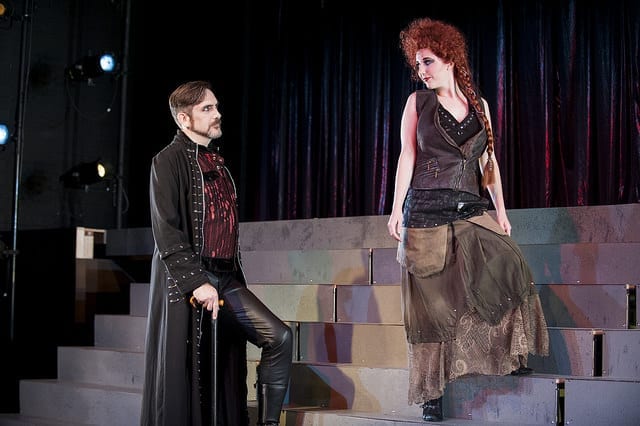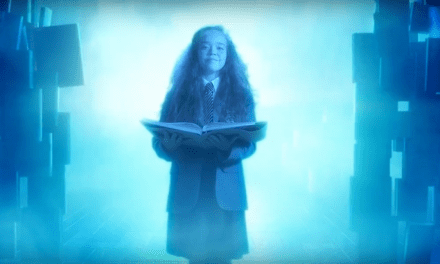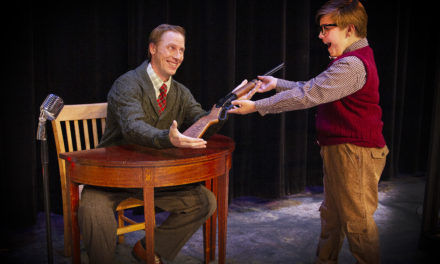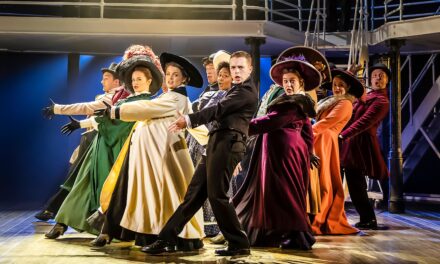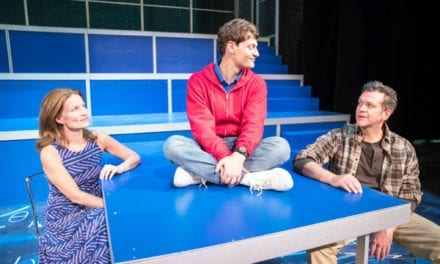SALT LAKE CITY — Bertold Brecht’s The Threepenny Opera offers a satiric view of capitalism in Victorian London. Opening with the familiar standard, “The Ballad of Mack the Knife,” the musical follows Macheath, a prominent figure in the city’s criminal underbelly. When Macheath becomes engaged to a miss Polly Peachum—whose father tightly controls all of city’s beggars—Messrs. Macheath and Peachum engage in a struggle for power over London’s lowest classes.
Directed by Denny Berry, the University of Utah’s Department of Theatre incorporated several anachronistic approaches for rejuvenating the Victorian look without losing its period feel. The costumes (Megan Jensen), hair, and makeup (Amanda French) had a distinctly steam punk feel in which elements of Victorian dress and style were intermingled with bright makeup, wild hair, and punk accessories.
The stage was backed by a wide screen across which would often be projected either the names of scenes and songs, or images from Peachum’s tablet. Peachum’s website would often pop up with labels for different clothing accessories, and then a live model would step in front of the screen to have his various apparel labeled and described as part of Peachum’s latest clothing line for the beggars he commissioned across London (scenic and video design by Dan Evans).
 The set design was simple but impressive. The stage was made up of wide steps, in four sections that could be moved back and forth across the stage, with at least one or two openings between them for characters to pass in and out. Actors could enter from the top of the steps (to be backed by the projector screens) or from the portals on the lower level of the stage portals between the wide sections of stairs. Actors sometimes carried props on or off stage between scenes, but they worked largely on a bare stage.
The set design was simple but impressive. The stage was made up of wide steps, in four sections that could be moved back and forth across the stage, with at least one or two openings between them for characters to pass in and out. Actors could enter from the top of the steps (to be backed by the projector screens) or from the portals on the lower level of the stage portals between the wide sections of stairs. Actors sometimes carried props on or off stage between scenes, but they worked largely on a bare stage.
 The play’s lighting (Jack Roach) was nearly flawless, but the sound design (Adam Harris) didn’t do justice to many of the play’s vocal performances and Kurt Weill’s score and Marc Blitzstein’s English lyrics. It may have been because of the instrumental recordings themselves, but I didn’t feel that the accompaniment matched the energy of the many outstanding vocal performances.
The play’s lighting (Jack Roach) was nearly flawless, but the sound design (Adam Harris) didn’t do justice to many of the play’s vocal performances and Kurt Weill’s score and Marc Blitzstein’s English lyrics. It may have been because of the instrumental recordings themselves, but I didn’t feel that the accompaniment matched the energy of the many outstanding vocal performances.
The most notable performances were given by Mark Fossen as Macheath, Michael S. Johnson as Mr. Peachum, and McKenna Kay Jensen as Mrs. Peachum. Each of these lead actors expressed impressive talent vocally as well as acting with entertaining energy. Brian Manternach’s Police Chief Tiger Brown was an especially amusing character due to his straight-faced nonchalance in the face of dramatic circumstances. And Cooper Howell played the beggar Filch with enough energy to evoke a laugh even when his performance was over-the-top.
The University of Utah’s The Threepenny Opera takes a well-known musical and airs it out to make it feel like something new. All of the vocal and comic performances were strong. Combined with the costumes, makeup, hair, and set design – which are all worth the price of admission on their own—this is a must-see show.

